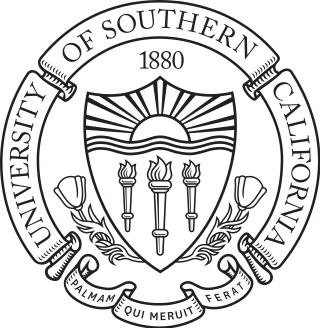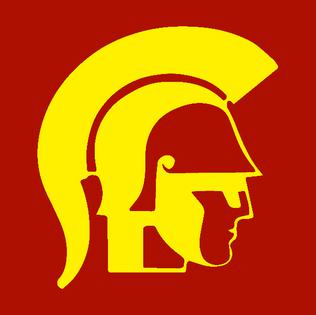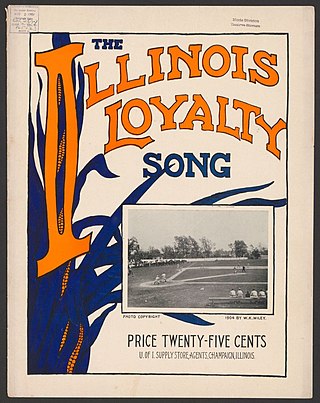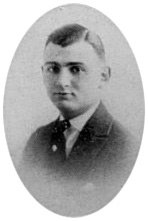Related Research Articles

The University of Southern California is a private research university in Los Angeles, California, United States. Founded in 1880 by Robert M. Widney, it is the oldest private research university in California, and has an enrollment of more than 49,000 students.
A fight song is a rousing short song associated with a sports team. The term is most common in the United States and Canada. In Australia, Mexico, and New Zealand, these songs are called the team anthem, team song, or games song. First associated with collegiate sports, fight songs are also used by secondary schools and in professional sports.
"On, Wisconsin!" is the fight song of the Wisconsin Badgers at the University of Wisconsin–Madison. A version with modified lyrics is the official state song of Wisconsin.

"The Eyes of Texas" is the school spirit song of the University of Texas at Austin. It is set to the tune of "I've Been Working on the Railroad". Students, faculty, staff, and alumni of the university sing the song at Texas Longhorns sports games, before the fireworks and other events.
The Aggie War Hymn is the war hymn of Texas A&M University; officially, the school does not have a fight song.

The USC Trojan Marching Band, also known as the Spirit of Troy and nicknamed The Greatest Marching Band in the History of the Universe (TGMBITHOTU), represents the University of Southern California (USC) at various collegiate sports, broadcast, popular music recording, and national public appearance functions.

"The Victors" is the fight song of the University of Michigan. Michigan student Louis Elbel wrote the song in 1898 after the football team's victory over the University of Chicago, which clinched an undefeated season and the Western Conference championship.
The Spirit of Aggieland is the alma mater of the Texas A&M University. It was originally written as a poem by Marvin H. Mimms while he was a student at Texas A&M. Richard J. Dunn, the director of the Fightin' Texas Aggie Band at the time, composed the music. Students, faculty, and former students of the A&M sing the song at Aggie sporting events, Muster, and other events.
"Victory for MSU", formerly "MSU Fight Song", is the official fight song of Michigan State University. It was created in early 1915, when MSU was known as Michigan Agricultural College (M.A.C.). An MSU cheerleader, Francis Irving Lankey, along with lyricist Arthur Sayles, created the song. With several changes noted below, the school has used the same song ever since. The MSU Fight Song is played at all university sporting events and is frequently sung by students and alumni.

"Illinois Loyalty", also known as "We're Loyal to You, Illinois" or just "Loyalty", is a song associated with the University of Illinois Urbana-Champaign. It is the school's alma mater. It is also used as the school's fight song.

The Sun Devil Marching Band (SDMB), also known as The Pride of the Southwest, is the athletic band of Arizona State University in Tempe, Arizona. The Sun Devil Marching Band motto is “Expect Great Things.” The acronym EGT is inscribed on a sign that hangs from the director's podium towering over the band's practice field, and is a symbol of the high standards that band members strive to meet. The ASU Band program, which includes the Marching, Pep, and Dixieland bands, is a part of the Sun Devil Athletics department. The band is currently under the direction of Director of Athletic Bands James G. "The Hammer" Hudson, who took over the program in 2006. The Sun Devil Marching Band is a major ambassador for Arizona State University and the state of Arizona. Each year almost 500,000 people are entertained by the band, which plays at home football at Sun Devil Stadium and as a pep band for basketball games at Wells Fargo Arena, homecoming, bowl game parades, other community events in the Valley, across the country, and even abroad.

Formed in 1845, the Holy Cross Goodtime Marching Band is one of the oldest organizations at The College of the Holy Cross in Worcester, Massachusetts, USA, and one of the oldest college bands in the United States. The Crusaders Marching Band first began performing at football games in 1910 and the band's role has expanded significantly since to include other athletic appearances, performing at all home football games, selected away games, in exhibition at high school band competitions, and at various events throughout the country. In the spring, the marching band converts into the Holy Cross Crusader Pep Band and plays at all home basketball games, and travels with the teams to the NCAA tournament. The Marching Band performs at Fitton Field while the Pep Band plays in the Hart Center.
"Glory, Glory" is the rally song for the Georgia Bulldogs, the athletics teams for the University of Georgia. The melody of "Glory, Glory" is the same as that of "Say Brothers Will You Meet Us," "John Brown's Body," and "Battle Hymn of the Republic." The song was arranged for the University of Georgia Band by member, and later Department of Music chair, Hugh Hodgson in 1915.

The Oregon Marching Band (OMB) is the marching band of the University of Oregon in Eugene, Oregon, United States. With over 200 members, it is the largest student organization on campus, and its members come from nearly every department and major at the university. The marching band serves as the foundation for the larger Oregon Athletic Bands organization that includes the Oregon Basketball Band, Winter Drumline, and the Green and Yellow Garter Bands.
"The Fighting Gamecocks Lead the Way" is the fight song of the University of South Carolina (USC). It was adapted from the musical number "Step to the Rear" in the Broadway show How Now, Dow Jones with new lyrics written by Gamecocks football coach Paul Dietzel.

The Thunder of the East is the marching band of the University at Buffalo in the State University of New York system. UB's first marching band was created in 1920, and disbanded in 1927. It was revived in 1946, increasing in size and reputation until about 1970. It was known as "The Pride of the East." At that time, it was dissolved upon UB's departure from Division I athletics. In 1981, some UB students continued the tradition of playing music at UB's home football and basketball games by forming UB's Pep Band. In anticipation of UB's return to Division I athletics, a marching band was formed in 1999 and named, "Thunder of the East." The band debuted at the University at Buffalo Stadium on September 11, 1999. The Thunder of the East is currently led by James E. Mauck; and performs at UB's Buffalo Bulls home football games, as well as in other musical venues.

"Hail to Pitt" is the most traditional fight song of the University of Pittsburgh, which is commonly referred to as Pitt. The saying "Hail to Pitt!" is also the most traditional and commonly used slogan of the University of Pittsburgh and its athletics teams. The slogan is frequently used in promotional material, printed on merchandise and souvenirs. It was also the title of a 1982 history of Pitt athletics by author Jim O'Brien. The slogan is often used among alumni as a statement of affiliation, including as a closing signature in conversation or correspondence between alumni, and is sometime abbreviated as "HTP" or "H2P", the latter of which is a registered trademark of the university and is frequently used on official university signage and merchandise.

The "Pitt Victory Song", one of the most popular and widely used fight songs of the University of Pittsburgh, is often played in conjunction with "Hail to Pitt" and the "Panther Song". It was originally written by former to students of the university in order to solve the issue of the university not owning the copyright to "Hail to Pitt" which prevented the school from granting permission for its use during football radio broadcasts. Lyrics were written by G. Norman Reis and Louis M. Fushan. Music was written by Benjamin Levant. The song debuted in the Cap and Gown Club's 1938 musical production entitled Pickets, Please! Although commonly performed at university events, few people today know the rarely heard first portion of the song that occurs before the chorus. However, the most common cheer that is used during Pitt-related events and athletic contests is "Let's go Pitt!", which while perhaps derived from the song's lyrics, is often cheered even in absence of the song or music.

The Carolina Band, or the Mighty Sound of the Southeast, is the official marching band of the University of South Carolina. With an average membership of 360, it is the largest ensemble associated with the university's School of Music. The marching band performs at all South Carolina Gamecocks football home games played at Williams-Brice Stadium, as well as neutral site games, bowl games, and all games against Clemson, where both the Carolina Band and Clemson's Tiger Band both perform at half time regardless of which school is hosting on a given year.
"Tribute to Troy" is an epic fanfare most frequently associated with the University of Southern California (USC), whose fans use it as a fight song. It was composed in 1965 by Ronald Broadwell, the director of USC's Spirit of Troy marching band. Variously described as "an incessant stanza of pounding drums and blaring horns," and "reminiscent of rallying the citizenry to guard the perimeter of the ancient Troy city-state," it is traditionally performed at USC Trojan football games following each USC defensive stop. A count in 2011 found that the song was played nearly 600 times over the course of that year's football season.
References
- ↑ Trojan Marching Band Press Pack, p. 16 Archived 2012-09-17 at the Wayback Machine . 2009.
